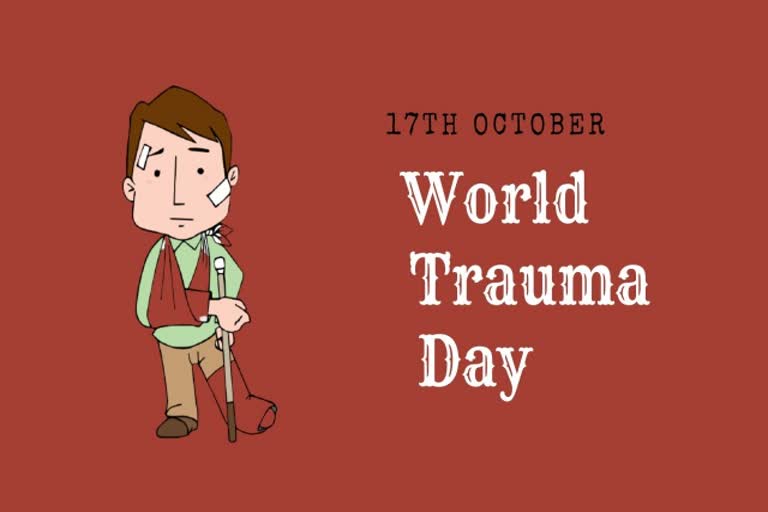Every year, millions of people all over the world become victims of death or physical disability due to sudden tragic events, which not only affects the victim, but his/her family, friends and relatives as well. Every year on 17th October, World Trauma Day is celebrated around the globe with the aim of making people aware of how safety and precautions can keep a person away from becoming a victim in such situations.
The National Health Portal (NHP) of India states, “Trauma means "any injury caused to the body". The injury may be caused due to many reasons like road accidents, fires, burns, falls, acts of violence and crimes against the vulnerable population including women, children and elderly. Amongst all the causes, Road Traffic Accident (RTA) is the leading cause of trauma across the world. Many injuries may lead to temporary or permanent disability while others may even cause death. Every year, about 5 million people die from injuries across the world. In India alone, it is estimated that one million people die and 20 million are hospitalized every year due to injuries.”
Avoiding Accidents
Since most of the traumatic events happen as a result of road accidents, here is what NHP recommends, that you need to take care of:
Do's
- Follow the road safety rules carefully.
- Pay close attention to the warning signs and traffic signals while driving.
- Always wear a helmet while riding a two-wheeler.
- Avoid distractions like mobile phones and loud music while on road.
- Take short breaks in case of long, continuous driving.
- Keep your children away from electric switches and wires, sharp objects and medications.
- Always keep a first aid safety kit at your home and in your vehicle.
- Ensure that your stairs, windows, balconies and roofs are secure in order to prevent falls.
- Learn basic life support techniques and help the injured.
Don'ts
- Do not drive when you are tired, sleepy or drunk.
- Do not take any risks while driving, in case you are in a hurry.
- Do not operate hazardous machinery.
- In case of a head or spinal injury, do not move the person from the site of accident without any professional's help. Moving the injured person may cause serious back or neck injuries.
- Do not give fluids to any unconscious or semi-conscious traumatized person.
Post-Traumatic Stress Disorder
Traumas may not only affect a person physically, but may also have a great impact on one’s mental health. This mental condition is often referred to as Post-Traumatic Stress Disorder (PTSD), which the Centers for Disease Control and Prevention (CDC) defines as, “an intense physical and emotional response to thoughts and reminders of the event that last for many weeks or months after the traumatic event”. CDC also categorizes the symptoms of PTSD into 3 broad categories, which are:
- Symptoms of re-living include flashbacks, nightmares, and extreme emotional and physical reactions to reminders of the event. Emotional reactions can include feeling guilty, extreme fear of harm, and numbing of emotions. Physical reactions can include uncontrollable shaking, chills or heart palpitations, and tension headaches.
- Symptoms of avoidance include staying away from activities, places, thoughts, or feelings related to the trauma or feeling detached or estranged from others.
- Symptoms of increased arousal include being overly alert or easily startled, difficulty sleeping, irritability or outbursts of anger, and lack of concentration.
“Other symptoms linked with PTSD include: panic attacks, depression, suicidal thoughts and feelings, drug abuse, feelings of being estranged and isolated, and not being able to complete daily tasks”.
Dealing With PTSD
PTSD can be dealt with in many ways and you can always consider taking help from a doctor or mental health professional. CDC suggests some of the ways to deal with PTSD:
What Can You Do for Yourself?
- Understand that your symptoms may be normal, especially right after the trauma.
- Keep to your usual routine.
- Take the time to resolve day-to-day conflicts so they do not add to your stress.
- Do not shy away from situations, people and places that remind you of the trauma.
- Find ways to relax and be kind to yourself.
- Turn to family, friends, and clergy for support, and talk about your experiences and feelings with them.
- Participate in leisure and recreational activities.
- Recognize that you cannot control everything.
- Recognize the need for trained help, and call a local mental health center.
What Can You Do for Your Child?
- Let your child know that it is okay to feel upset when something bad or scary happens
- Encourage your child to express feelings and thoughts, without making judgments
- Return to daily routines
Therefore, people can recover from traumas if timely care and assistance is given to them. But it is important for family and friends of the victim to not lose their hopes and stand by them even in the worst case scenarios.



